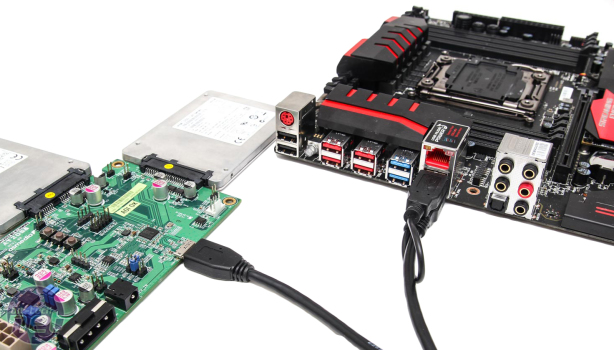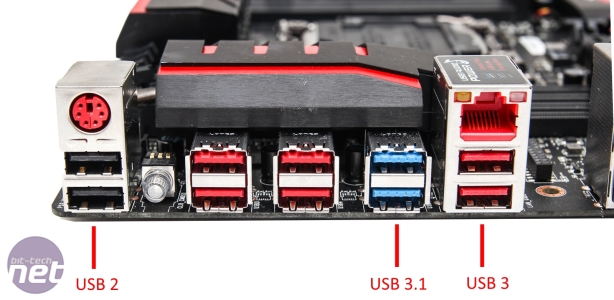
Performance Analysis
We only had a fairly short period to test the kit and coupled with a few early hiccups, we were unable to grab results for an Intel SATA 6Gbps-based RAID array using the Intel SSDs, nor for the on-board VIA USB 3 controller, although the latter won't likely have bettered the Intel X99-based USB 3 ports anyway. However, MSI claims figures of around 1,000MB/sec for a SATA 6Gbps-based RAID array so you can use that as a rough guide.The sequential speeds in CrystalDiskMark were a little slower than MSI's own results but we've seen varying speeds where the kit has been featured elsewhere too so we're not unduly concerned. In any event, the USB 3.1 setup was 65 per cent faster than the X99 PCH USB ports, with a read speed of 645MB/sec compared to 392MB/sec. There was less of a difference with the sequential write speed - 505MB/sec versus 404MB/sec.
The biggest difference by far, though, were the 4K random read tests. With a single queue depth, the read speed of 23.85MB/sec compared favourably to the Intel X99 PCH USB 3 speed of 18.7MB/sec and came close to toppling some of the slower SATA 6Gbps SSDs too. The write speed was off the chart, though, and at over 64MB/sec, this again isn't far off what you'd see from a modern SATA 6Gbps SSD and was nearly three times faster than the USB 3 result.
Click to enlarge
With a queue depth of 32, the write result was faster still, although here the USB 3 controller made up some ground and was around 50 percent as fast. The USB 3.1 results of 25.6MB/sec and 75MB/sec read and write speeds respectively are also a lot slower than typical STA 6Gbps speeds with most of the results we've seen recently managing well over 300MB/sec.
The ATTO Disk Benchmark confirms the sequential speeds we saw in CrystalDiskMark with maximum read and write speeds of 580MB/sec and 409MB/sec - again much faster than USB 3. Our final test included transferring a 2GB MKV file and 2GB of mixed files to and from the RAID array. It was a similar story with USB 3.1 proving to be significantly faster than USB 3, particularly so at reading data. Our mixed small file test actually saw the biggest lead, with roughly 100 percent gains in both read and write speeds - this bodes very well for large external storage devices and anyone that regularly dumps gigabytes of small or mixed files onto portable drives.
Click to enlarge
Conclusion
The new USB standard is very promising indeed and while there's clearly not the kind of gains on offer that we saw in the move to its predecessor from USB 2, they're certainly very welcome. Perhaps the most significant improvements are the boosts to random read and write speeds, the latter especially so and the fact that in some tests these were close to matching SATA 6Gbps SSDs will hopefully lead to real boosts in external storage performance.The main issue, of course, is how these speeds are achieved. At the moment you need two 6Gbps SSDs in a RAID array to make use of the extra performance so it's likely that some fairly elaborate and expensive setups will be needed at first. With SSD flash storage rumoured to match hard disk price per gigabyte in the not too distant future, though, there is the potential for a revolution in external storage in the area dominated by 3.5in hard disks at the moment. That's a couple of years down the line of course but once USB 3.1 is incorporated into popular desktop board chipsets and maybe even offered in PCI-Express expansion cards like the early days of USB 3, it will only be a matter of time before it takes over from USB 3.

MSI MPG Velox 100R Chassis Review
October 14 2021 | 15:04










Want to comment? Please log in.